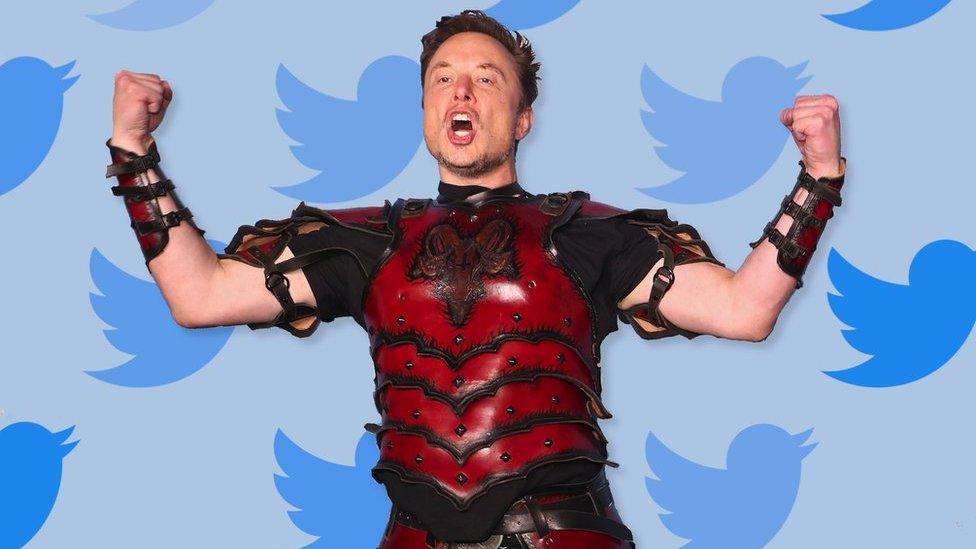Why is Elon Musk spending his time on Twitter, not on the mission to Mars?
- Published
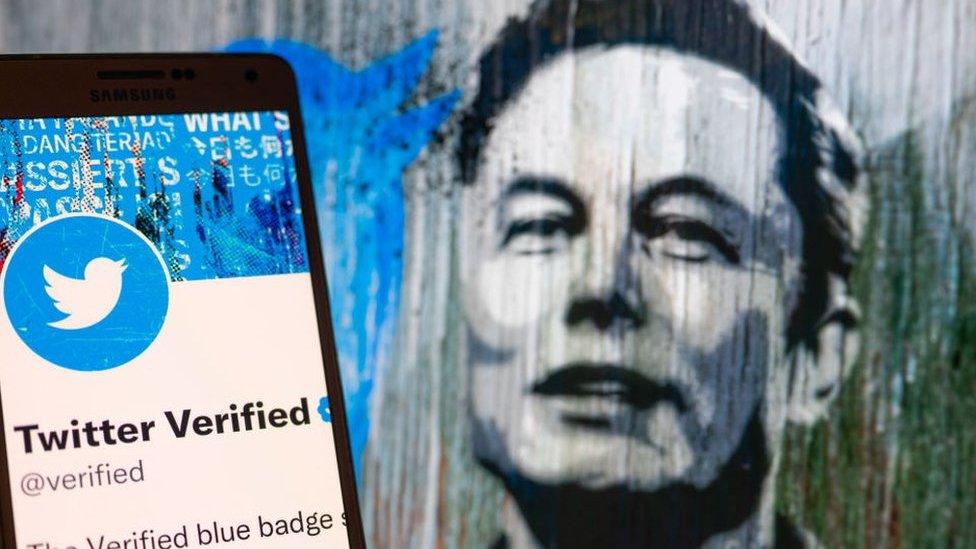
I have been watching Elon Musk for a number of years - and more closely than ever in recent months, since he decided, seemingly on a whim, to buy the social network Twitter.
He is one of the world's richest men - sometimes the richest, depending on the price of Tesla shares, his main financial asset. With a string of other high-profile companies under his wing, including Tesla, Space X, Starlink, and Neuralink, he is also a subject of global fascination.
Then, of course, there is his own personal story - the tall, 51-year-old billionaire with 10 children ranging in age from one to 18. His first son died aged just 10 weeks. Musk, who was born in South Africa, has described living with Asperger's syndrome, a type of autism, and stated that his main goal in life is to colonise Mars.
What I have learned is - as, perhaps, with many of us - there are many different faces of Elon Musk.
The persona he projects via his prolific tweets is provocative, controversial and bombastic. He loves a rude meme, knows whatever he says will make headlines around the world, and enjoys trolling the media with ever more outlandish statements and jokes. He likes trying to goad us journalists into writing ever more extreme headlines.
In public, he has learned to be a showman, whether dancing alongside electric-car-making robots, emerging triumphantly from the latest slick Tesla prototype, or being filmed walking into Twitter's headquarters carrying a sink - "Let that sink in" was the gag, playing off a popular meme on the site, external. This Halloween, he attended a party in leather armour, a $7,500 costume called "the devil's champion".
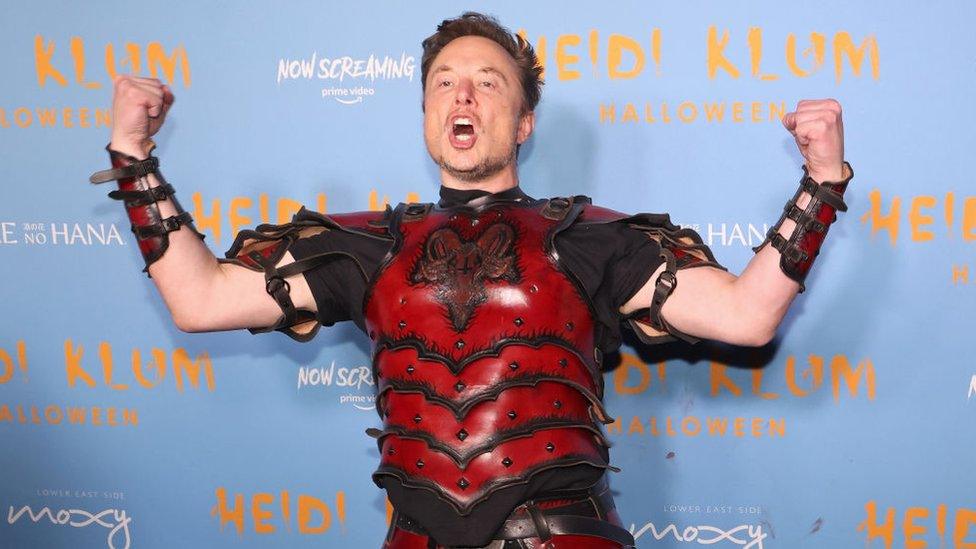
And yet Tallulah Riley, his ex-wife, whom he married twice, described him in BBC documentary series The Elon Musk Show as "sweet" and "shy".
Veteran Silicon Valley journalist and author Mike Malone, who has known Mr Musk for 20 years, tells me he sees "a very reserved, very smart, very introspective and intellectual guy" who spends long transatlantic flights with him reading complex trajectory tables, trying to work out how to land a spacecraft on Mars.
The pair have a long-standing $5 (£4) bet over Mr Musk's ambition to send people to Mars by 2030. "I said, 'I don't think you can do it - but I hope you do. I hope I owe you the $5,'" Mr Malone says. "That bet's still floating in the air".
Sending people to Mars is a lifelong goal for Mr Musk. Some say it is his take on long-termism - a philosophy favoured by some very rich people which seeks to act in the interests of billions of people in the far future, rather than focusing on the immediate needs of the present.
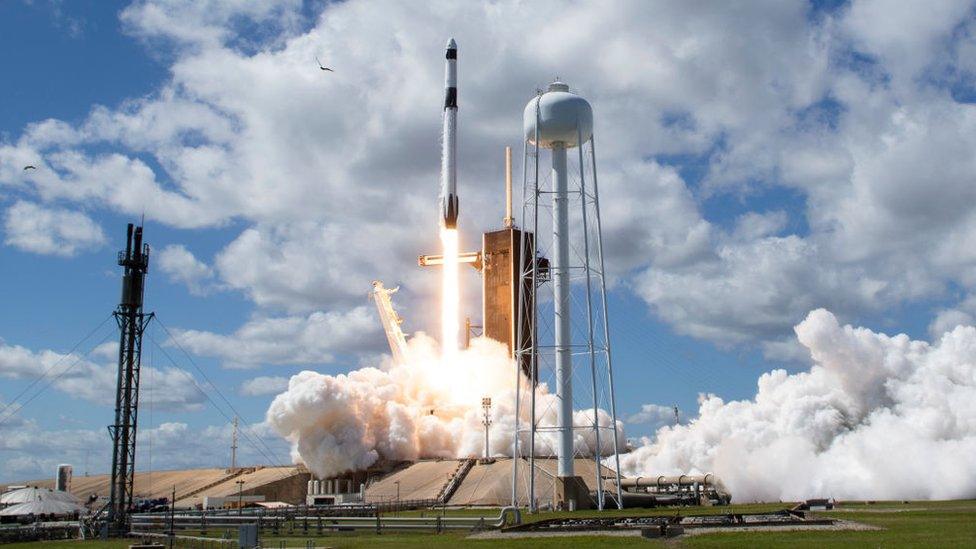
Musk hopes his Space X rockets could one day help to colonise Mars
At some point, the human race is going to have to leave Earth, he says. And his interest in space is clearly signposted in his existing business portfolio. But where, on Earth, does Twitter fit in?
Mr Musk answered that question, this week - in a tweet.
"Social media in general, especially Twitter, were eroding civilisation," he wrote. "If civilisation collapses before Mars becomes self-sustaining, then nothing else matters. Human consciousness is gone."
But how was Twitter "eroding civilisation"?
Mr Musk said, at the very beginning, his aim in buying the platform was to create a 21st Century digital, global town square for discussing society's big issues.
He has written many times about perceived imbalance under the previous regime, arguing that right-leaning views were given less visibility by Twitter staff than left-leaning ones, skewing debate and creating echo chambers where nobody saw material that challenged their existing viewpoint. With some handpicked journalists, he published the "Twitter files", a selected set of internal documents, to support his view.
Allow X content?
This article contains content provided by X. We ask for your permission before anything is loaded, as they may be using cookies and other technologies. You may want to read X’s cookie policy, external and privacy policy, external before accepting. To view this content choose ‘accept and continue’.
The amount of abuse and misinformation thrown around on the platform could also be seen as distracting from the real issues Mr Musk wants discussed.
But as anyone who has ever tried will know, navigating that tightrope between allowing free speech and suppressing hateful content is very, very hard.
Maybe there is a connection somewhere in Mr Musk's mind between Twitter and Neuralink, which is trying to create a direct link between human brains and computers.
Could it be that Twitter forms part of his research and he has essentially bought himself a living, breathing neural network of 300 million people sharing their lives, and opinions, in real time, online?
OK, we are in the realms of science fiction. But transporting that to another planet in some form would be one way of taking human consciousness away from Earth - and we know Mr Musk likes a challenge.
Different challenge
Mr Malone may never see his $5 - and betting against Mr Musk is generally a bad idea, entrepreneur Dolly Singh, who worked with him for six years at SpaceX, until 2013, says.
"I would, by rule, never bet against him," she says.
"Anything that's a machine - hands down, he's going to win."
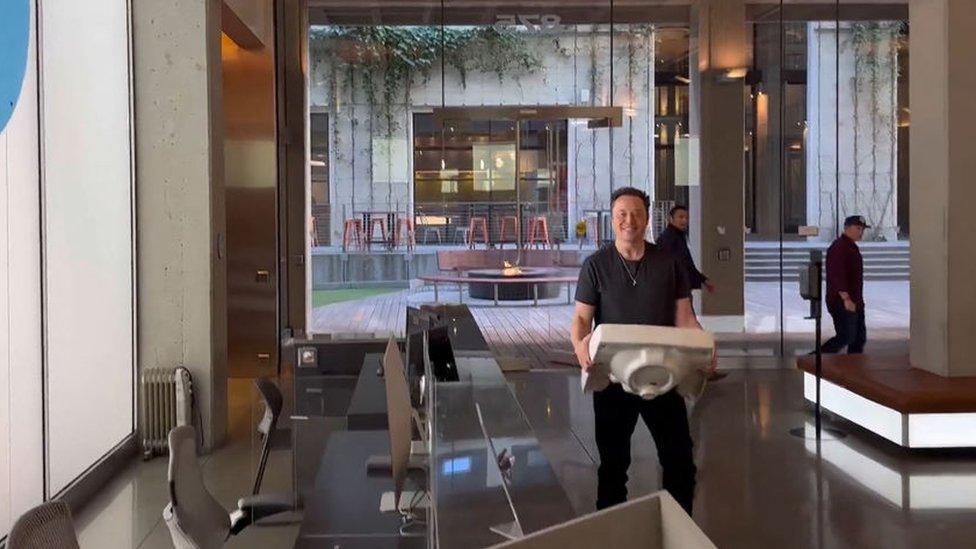
Elon Musk entered Twitter carrying some sanitaryware as a nerdy joke: "Let that sink in."
But Ms Singh also thinks Twitter presents her former boss with a different challenge.
"This is going to be harder than he has anticipated - and it's going to be a lot of work for him," she says.
Messy network
Mr Musk has talked openly about preferring engineering and code to people. Growing up, he did not understand people did not necessarily say what they meant, he told a Technology, Entertainment, Design (Ted) conference in Vancouver, last year.
In a text message, released as part of court papers for a legal case against Twitter that never actually happened, he wrote: "I interface way better with engineers who are able to do hardcore programming than with program managers/MBA [Master of Business Administration] types of people and/or frankly I hate doing mgmt [management] stuff. I kinda don't think anyone should be the boss of anyone. But I love helping solve technical/product design problems."
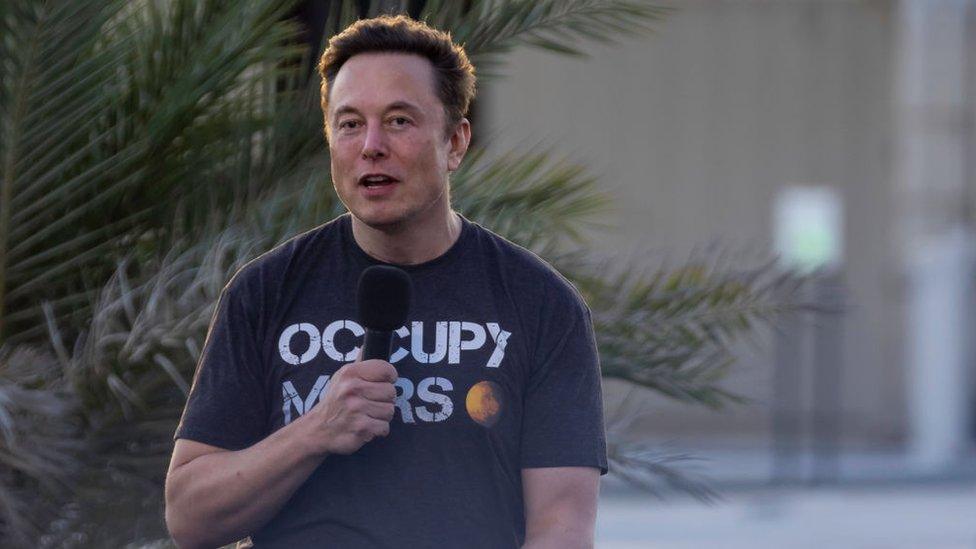
His problem is that Twitter is one huge messy network of millions of people shouting, laughing, teasing, trolling, arguing - loud, complex and nuanced.
Mr Musk has already struggled with trying to moderate it, even with a promise of a lighter touch than the previous regime.
And Ms Singh is not the only observer to ask whether he will find it more difficult to run smoothly than he imagined.
'Hard worker'
As a businessman and a leader, he can be brutal - although arguably no more so than other chief executives.
Within one week of buying Twitter, he had laid off half the workforce. Those remaining were asked to sign contracts committing to an "intense" work ethic and long hours.
Pre-Twitter, he was one of the first to call for the staff of all his companies to be back at the workplace full time following pandemic lockdowns.
And he will not tolerate less than 100% commitment from his employees.
Ms Singh describes the Musk she knew as an "incredible leader", determined to "prove everybody wrong" when told he cannot achieve something, and, as is often said about him, a phenomenally hard worker.
"Elon wants to live in a world where he works 80 hours a week," she says.
"It's OK for him to say, 'I expect you to work as hard as me,' because he's not phoning it in from the beach, he's sleeping in a sleeping bag on the factory floor."
Most people, she says, burn out after a while. He does not.

Two sofas with bedding on them
He has installed beds in Twitter's San Francisco headquarters, seemingly for his staff - although, he is understood to be sleeping there himself. He even shared a picture of his two-year-old son, X, wearing a company pass.
Others who worked with him in the 1990s also recall his extraordinary work ethic. He was furious, one said, to find nobody in the office at 21:00 on a Friday night.
Ms Singh says his time is Mr Musk's most precious commodity.
"Think about what it's worth, per second," she says.
You do not need to do the maths to know it is eye-watering.
And right now, he is pouring it all into Twitter.
Perhaps Mr Malone should not spend his $5 just yet.
You can follow Zoe Kleinman on Twitter @zsk, external.
Related topics
- Published12 April 2023
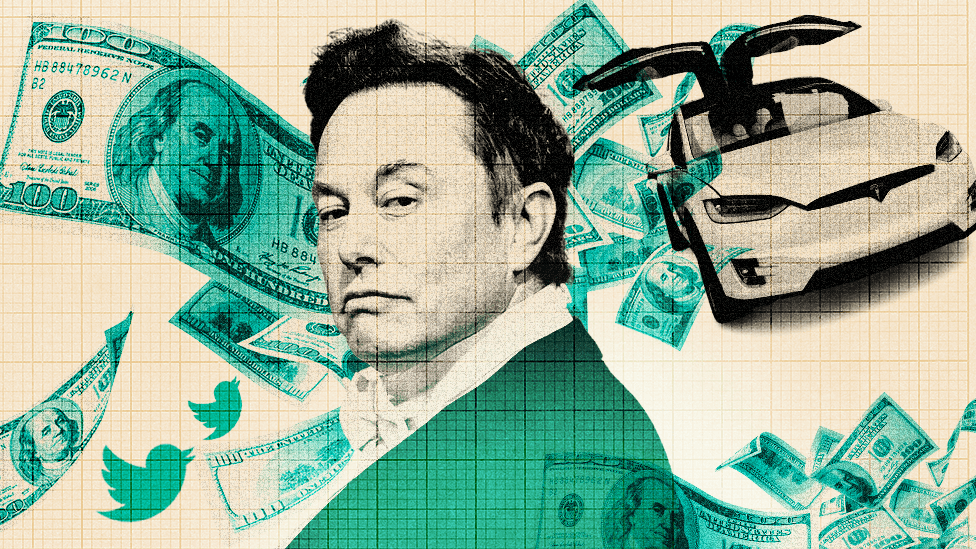
- Published14 December 2022
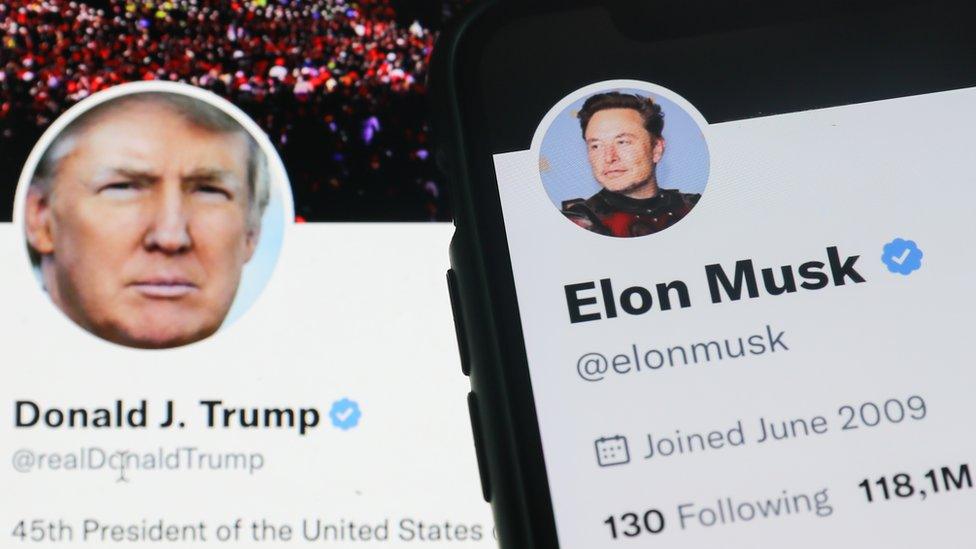
- Published29 November 2022
